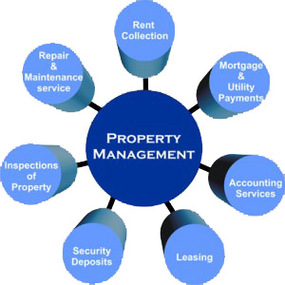 And if Paid by today, you get a 5% rebate. Some important Dates:
The simplest method is to pay online, if you have your PID number or Application ID. The link to pay is: http://bbmp.gov.in/online-property-tax-payment If you don't have your new PID number, you can get it here: http://asbpa.bbmp.gov.in/newpid/ Here is also a list of banks where you can pay your taxes over the counter:
For other important & interesting updates:
0 Comments
 There are various types of companies and models that exist in the property management space. As the market is far older and more mature in the western countries, let's first discuss the models that exist there: 1. Multi-unit buildings - There are large property management companies that manage the rental units in large apartment buildings. They have an office in the premises, and all rentals for any apartment in that Complex are managed by them. They operate by taking a percentage of the rent (usually 10-15%), and also run the maintenance department in the building. They are responsible for rent collection from the tenant, and pay the rent to the respective owners. 2. Single Family homes - In addition to managing large buildings, property management companies also manage single unit homes. Usually some companies will specialize in this space. The business model is the same, and they operate by taking a percentage of the rent when the property is occupied. More often that not, they also charge a fee for placing a new tenant, every time there is a tenant change. 3. Vacant house & land monitoring - In this case, the mandate of the company is to monitor the house or the land, and report status back to the owner. Instead of a percentage of rent, these companies charge a fixed monthly or annual fee. 4. Serviced apartment management - several property management companies specialize in running units as service apartments. They take furnished apartments from property owners, market the properties, take care of all operations, and share the revenue with the owner, with a majority going to the property manager. 5. Guaranteed Rental - In this case, the property management company will lease out a property from the owner, and pay rent irrespective of whether the property is occupied or not. This model usually works for smaller units in a very hot location that are easy to rent. 6. Brokerage firms who manage a few homes as a side business - these are mostly mom and pop shops, who also manage a few homes for their clients. However, it's not something they specialize in or focus on, or only a small percentage of their income comes from Property Management. 7. Facility Management - This is yet another kind of model where the company manages the common facilities and amenities in a large apartment unit, such as the maintenance department, the pool, the gym, the cleaning staff, etc. They usually get a fixed monthly fee for managing the services. They do not manage the units within the apartment complex. 8. Commercial property management - This is very similar to the service apartment model, where property managers will convert the property into a retail unit or a plug and play office by furnishing it, and share revenues with the owner. In India, Property Management is still in it's nascent stage. It's more focused on absentee owners who don't live in the same city as the property. While several of the models above do exist in India, it is still a young market and the companies in this space are innovating constantly to fill in the gaps that exist. There are many different types of property management companies available in the market. One must research well about these companies, clearly define the requirements and then make an informed decision.  Let's first start with the "Why". Today, anyone can become a builder and/or a real estate agent, and/or a property manager. Now, why is that a bad thing? Well, if everyone who chose to become a builder or agent, chose to operate ethically, there would be no problem. But, as we know, that rarely happens. If you have been lucky enough to not have been duped by someone in the profession, I am sure you would have heard of a friend who has. What's worse, is that nothing stops these unethical professionals, after having duped your friend, to continue operating! That is where a License and/or a Registration comes into play, which an individual/company is required to have by law, and which can be revoked, for the violation of the rules and regulations set by the Regulatory Authority. And it's not just a question of the professionals behaving unfairly. Recently, me and my husband were considering investing in a plot in Hennur in North Bangalore. It came at an attractive price, and we were close to sealing the deal with the current owner, when we happened to stumble on the fact, that the government had issued them a notice to acquire the land! Note that today there is no public database, where the status and legal validity of real estate projects can be checked. Now, coming to the "How". Let's see how the real estate market is regulated in developed countries: United States: In the United States, every agent and broker is required to have a State issued License that gives them the legal ability to represent a home seller or buyer in the process of buying or selling real estate in the United States. A broker represents one side - either the buyer or seller. In fact, representing both is called "undisclosed dual agency", which is unethical and illegal in all states. Now, compare this with India, where "dual agency" is most common, and most brokers will not work with others to close a deal, with the impact that deals become harder to close, as information is not freely shared. Rental properties in the US, are handled by property managers. In fact, if an owner is collecting rent directly from the tenant, many states require the owner to have a business license. Property managers are responsible for keeping owners and tenants satisfied with the condition of the property that they own and/or rent. The manager works for the owner but also responds to the needs of the tenant. Property managers are also required to have a state issued License. Real Estate developers in the US, on the other hand, do not need a License. England: Surprisingly, until 4 years ago there was no Licensing scheme for Realtors in England. It was introduced by the NAEA (National Association of Estate Agents) in November 2010. However, England has several associations besides the NAEA. For example, companies which manage rented residential property are often members of the Association of Residential Letting Agents. Companies or individual landlords who accept tenancy deposits for "assured shorthold tenancies" (the usual form of residential tenancy) are required by statute to be members of a Tenancy Deposit Scheme.Companies which manage apartment buildings are often members of the Association of Residential Managing Agents (ARMA). There are also several educational institutions that accredit Real Estate professionals in England. For example, land agents will need to be accredited by the Royal Institute of Chartered Surveyors, which means they will have been examined by the terms of this institute. There is also a qualification produced by The Association of Residential Lettings Agents called the Technical Award in Residential Lettings and Property Management (TARLPM). Australia: Australia mandates all their agents to be licensed. In fact, the law requires agents must conduct mandatory identification checks of all people wishing to sell their property. This aims to protect the property owners following fraudulent sales of properties. Canada: In Canada, Real estate agents must be licensed to begin working. Licensing is handled at the provincial level. Agents must have completed secondary school, complete a real estate training course and become licensed by their provincial government. Moreover, to use the designation of “realtor,” an agent must become a member of their local real estate board and of the Canadian Real Estate Association. Coming back to India, in 2013, there was in fact a Regulatory Bill passed, which proposed the following:
 There are many reasons you may need one, such as:
To start with it takes the responsibility off your shoulders. The company is now responsible for finding a good tenant, and keeping the property tenanted for as long as possible. Now, why is a property management company able to do this more effectively than you? Few reasons:
But having said that, is property management for everyone? Definitely not. If you are a hands-on landlord, and stay very close to your property and have the extra time to deal with tenanting and tenant management, then you can save a few extra bucks, doing so yourself. For everyone else, hiring a property management firm, will in fact, increase the returns on your property investment by close to 20%, if not more. |
Archives
July 2024
Categories |

 RSS Feed
RSS Feed